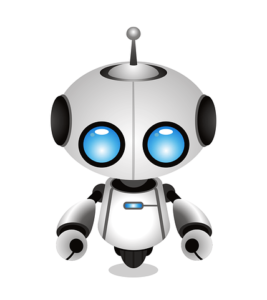Is the rise of the machines inevitable?
The ‘Terminator’ and ‘Matrix’ franchises, ‘Tron’, ‘Eagle Eye’, ‘I, Robot’, ‘2001: A Space Odyssey’, even the children’s film, ‘WALL-E’: most of us will have seen at least one movie in our lifetime that predicts the dire consequences of an over-reliance on artificial intelligence (AI). Are these films just fun or do they scare us too much? What difference is it really going to make in our workplace?
Search engines that predict our preferences, smart phones
and email filters all incorporate some degree of AI.
 We may not be thinking about artificial intelligence all of the time, but we do encounter it every day. Search engines that predict our preferences, smart phones and email filters all incorporate some degree of AI. And it is constantly developing: the battle for driverless cars, seems to be coming rapidly. Even some modern cars on the market have braking systems that automatically kick in if you get too close to an object in front.
We may not be thinking about artificial intelligence all of the time, but we do encounter it every day. Search engines that predict our preferences, smart phones and email filters all incorporate some degree of AI. And it is constantly developing: the battle for driverless cars, seems to be coming rapidly. Even some modern cars on the market have braking systems that automatically kick in if you get too close to an object in front.
But what difference is this going to make to our lives, our workplace, our colleagues and our employees?
While it is perhaps inevitable that AI will replace some low-skilled, repetitive jobs, it is highly unlikely that machines will be able to emulate human physiology to a level that would allow robots to truly replace a human workforce in the near future.
In so many ways, you are better than a machine
Look at your hands, your feet or your face. Compared to the most advanced robots out there today, you are infinitely more complex. The facial expressions you make and the thousands of nerve endings in your skin; things that we take for granted is are still far from being accurately recreated in an artificial form.
The development of technology means that small businesses can save valuable time and money by using accountancy software to manage finances and calculate tax and PAYE. In more hazardous industries, managers can delegate dangerous tasks to machines, reducing the risks for their human workforce.
However, the danger of an over-reliance on technology could mean that we fail to spot something that is clearly wrong. We need to understand the benefits and limitations of the technology that we use in our workplaces in order to get the most from it. We need to invest time and training to help employees develop new skills and keep up with technological advances on their field.
While managers cannot predict what artificial intelligence may change about their industry in the future, they can invest in the area that will most clearly remain the responsibility of a biological workforce.
Your humanity sets you apart
The level to which you have the ability to communicate, learn, empathise and reason sets you apart from the mechanical world. These skills enable you to develop creative thinking, initiative, teamwork and leadership abilities beyond those that artificial intelligence may ever achieve. But just having these capabilities doesn’t mean that we use them to their full potential. Our world is becoming increasingly reliant on technology…
…how can we ensure that we excel in the area
that only we can master – the human skills?
Know yourself and understand others
- Be proactive in developing and refining your human skills.
- Raise your self awareness [Shameless plug: we offer some great personality profiling tools including Insights Discovery, Clifton Strengths (StrengthsFinder) and ColorPersona.]
- Use your understanding of other people to tweak your communication for greater effectiveness
Our personality profiling workshops enable teams to improve employees’ awareness of both self and others, consequently improving communication and team work to the benefit of the business. Soft skills courses can help individuals to improve their creative thinking, problem solving or leadership skills.

